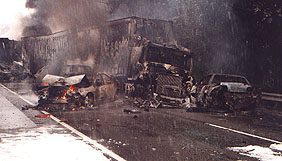Please discuss the ethical challenge of dealing with limited resources in a mass disaster.
(Question posed via: Ask@MauriceARamirez.com)
The importance of dealing ethically with people in times of limited resources deals not only with mass disaster, but business continuity and even daily business operations. Whether the limited resource is food water, and medical care in a disaster or wages, shifts and benefits in a business down turn a goal oriented decision process must be employed.
In a mass casualty event, Continuous Integrated Triage should be employed to determine who receives care now and who waits for care based on degree of injury balanced against resources available.
To maximize the delivery of products and services during a time of scarcity, Business Triage must be applied, even by non-healthcare enterprises.
The need for triage is not an opinion, but the consensus of the vast majority of experts in crisis management, healthcare and business continuity. To determine the ethics of such an approach, several ethics boards were asked to address the issue.
Dr. Mark Pastin, President of Health Ethics Trust believes that the need for triage is the, “simple and obvious answer.” Dr. Pastin points out that there is the “risk of violating what would ordinarily be viewed as your professional responsibilities if you do triage.” Dr. Pastin posed the example of an existing doctor-patient relationship with one of the casualties. Dr. Pastin, a long time advocate for resource based standards of care in disaster healthcare points out that the lack of such standards leaves an array of questions should the care available fall below the usual standard of care. Dr. Pastin also points out that some have even wondered if euthanasia might be appropriate to those who are suffering but not likely to be treated.
Ethicist Dr. Ken Solis finds that the distribution of limited resources equitably or most effectively is sometimes “opposing priorities.” Dr. Solis observes that “most disaster plans, for example, allocate a limited resources to health care workers (and their families so the health care worker is willing to show up at work), safety officials (police, firemen/women), and public officials to keep critical infrastructures operating and so that more subsequent people can be treated – a utilitarian or effectiveness approach. After that, most models go by ‘first come-first serve’ or ‘lottery’ to try to be equitable. Of course, those with the most means will still tend to come in earlier due to their greater resources and might even be able to cheat the lottery in some way, e.g. pay a poor person a lot of money for their ‘ticket’.”
Dr. Pastin and Dr. Solis agree that, in a disaster situation, some of the norms that guide the typical provider-patient relationship will undoubtedly become difficult to sustain. The 2001 anthrax attacks and subsequent fear resulted in behavior by physicians and other healthcare providers that culminated in a nationwide shortage of Cipro (ciprofloxin) and doxycycline.
Dr. Solis echoes the concerns of many both in and out of healthcare when he reminds us of another challenge: the competing interests that a health care worker will have balancing their family versus their patients. “Some healthcare providers will give priority to their family, especially if their absence could cause their family harm. Similarly, the healthcare provider may decide that their presence at the disaster (e.g. an infectious disease epidemic) could cause their family harm. During the black plaque in Europe, many doctors fled to the country side, not an effective tactic, but acted based on their personal priority.”
The decisions involved in the triage and resource allocation process will result in dissatisfaction at many levels. While the first principle of medicine for centuries had been Primum Non Nocerum (First Do No Harm), it is increasingly obvious that in disaster healthcare the first principle should be “Do the Most Good for the Most People with What You Have Now.”










